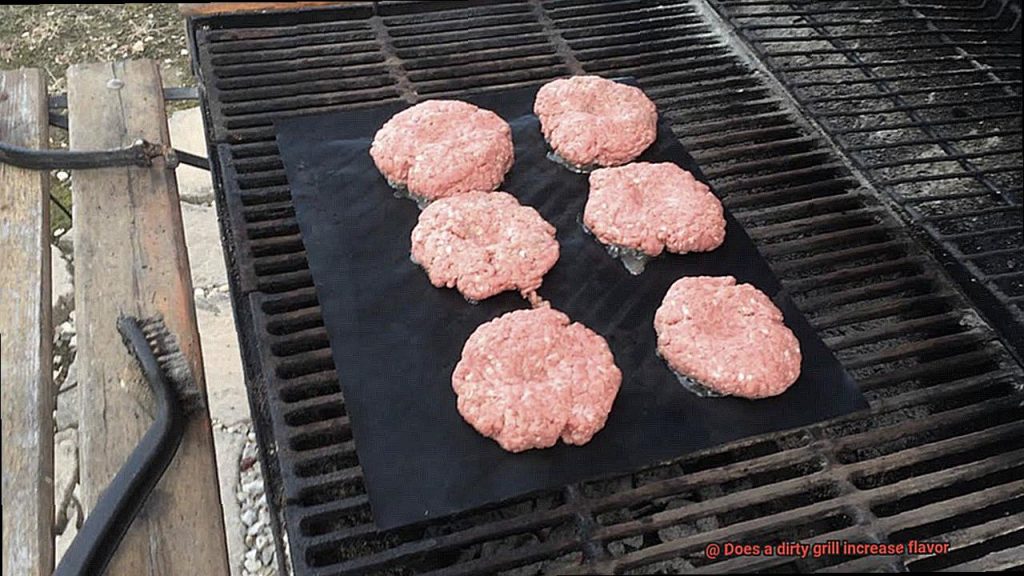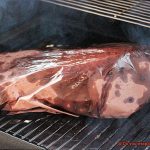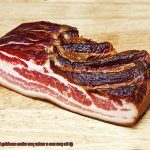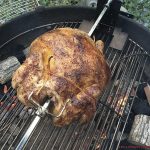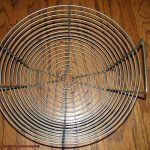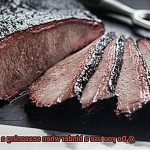Imagine this: you’re gearing up for a summer barbecue, your grill is prepped and ready to go, and your loved ones are eagerly anticipating the mouth-watering feast you’re about to serve. But as you lift the lid to check on your sizzling steaks, you can’t help but notice that your grill grates are caked with layers of dirt and debris. Suddenly, a burning question arises – does a dirty grill actually enhance flavor?
This topic has been hotly debated in the grilling community for ages. Some swear by the charred residue left behind on their grate, claiming it adds an irresistible smoky taste to their meats and veggies. Others argue that cooking on a dirty grill only leads to bitter-tasting food.
So, what’s the deal? In this blog post, we’ll dive deep into the science behind grill grime and how it may or may not impact the flavor of your food. We’ll explore both sides of the argument and provide some tips for those who prefer a cleaner cooking surface.
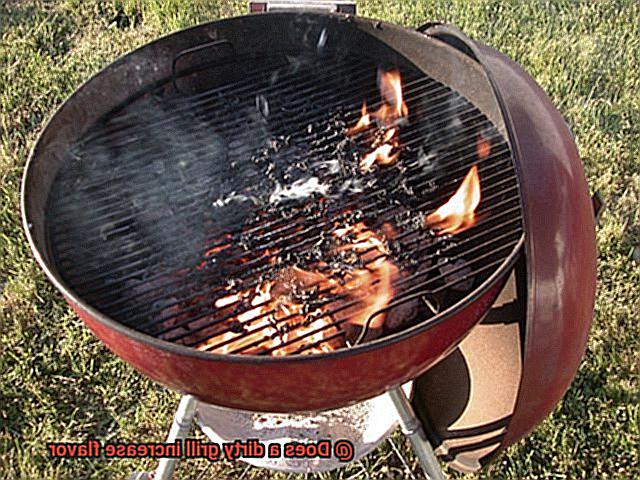
Whether you’re a seasoned grill master or just starting out, this is one debate you won’t want to miss. So sit back, relax, and let’s settle once and for all whether a dirty grill really does increase flavor or if it’s just another myth in the world of grilling.
Contents
The Benefits of a Clean Grill
Grilling is a beloved pastime enjoyed by many. The satisfying sizzle of meat on the hot grill, the tantalizing aroma wafting through the air, and the mouth-watering taste of perfectly cooked food are all part of the experience. However, one aspect of grilling that is often overlooked is the importance of a clean grill.
A clean grill is essential for several reasons, including enhancing the flavor of your grilled food. A dirty grill can harbor a buildup of grease, grime, and leftover food particles that negatively affect the taste of your food. In contrast, a clean grill distributes heat evenly, ensuring that your food cooks evenly and has a natural flavor. The result is a charred and smoky flavor that is highly desirable.
Another benefit of a clean grill is that it reduces the risk of flare-ups caused by excess grease. Flare-ups can burn your food and even create a dangerous situation if left unchecked. But with a clean grill, you’ll be able to avoid any unpleasant smells or tastes and cook your food safely.
Cleaning your grill after each use is crucial to maintaining the quality of your equipment. Regular cleaning ensures that you remove all leftover food particles and grease, preventing them from building up over time. This will help extend the life of your grill, saving you money in the long run.
So how do you keep your grill clean? Start by preheating it on high for 10-15 minutes to loosen any leftover food particles. Then turn off the grill and let it cool down before using a wire brush to scrub away any remaining debris. Finally, wipe down the grates with a damp cloth or paper towel to remove any remaining grease.
The Risks of a Dirty Grill
A dirty grill poses several risks, compromising not only the taste of your food but also your health and equipment. Let’s delve into the details and learn how to prevent them.
Risk #1: Bacteria and Foodborne Illnesses
A dirty grill can harbor harmful bacteria, grease, and other substances that can seep into your food, leading to foodborne illnesses. Imagine biting into a juicy burger, only to find out later that it made you sick. To prevent this, it is crucial to clean your grill thoroughly after each use, removing leftover food particles, grease, and other debris.
Risk #2: Negative Impact on Flavor
The buildup of grease and debris on your grill grates can create an undesired burnt or bitter flavor in your food. This can ruin your meal and leave you feeling unsatisfied. Moreover, the smoke from burning leftover food particles can impart an unpleasant taste to your meals. To avoid this, make sure to clean your grill before each use and deep clean it periodically.
Risk #3: Uneven Cooking and Equipment Damage
A dirty grill can affect the performance of your equipment by clogging the burners and affecting heat distribution. This can lead to uneven cooking and potentially undercooked or overcooked food. Additionally, a dirty grill can damage your equipment, leading to costly repairs or replacements. To prevent this, make sure to keep your grill well-maintained and clean it regularly.
So how do you prevent these risks? Regular cleaning after each use is essential to prevent the buildup of grease and other debris. Use a grill brush or scraper to remove any residue from the grates. You should also deep clean your grill periodically, especially if you notice significant buildup or if you have not used it in a while. Additionally, keeping your grill well-maintained will ensure that it performs at its best and prolongs its lifespan.
Does a Dirty Grill Increase Flavor?
If so, it’s time to set the record straight. While some people think that accumulated grease and charred bits on the grill grates can infuse meat with a smoky, savory taste, experts warn against this belief. Here are the reasons why:
Firstly, a dirty grill can actually make your food taste worse. The buildup of grease and carbon on the grill grates can create an unpleasant and bitter taste in your food, overpowering the natural flavors of your meats and vegetables. Who wants to ruin a perfectly good steak or burger by adding a bitter aftertaste?
Secondly, a dirty grill can pose serious health risks. Leftover food particles and grease on the grates can harbor harmful bacteria that can contaminate your food, leading to food poisoning or other illnesses. It’s not worth risking your health for a supposed “enhanced” flavor.
Moreover, a clean grill provides better cooking conditions. Even heat distribution is key to ensuring that your food cooks evenly and retains its natural flavors. A dirty grill can cause flare-ups that char your food, ruining its texture and taste. So if you want to have an optimal grilling experience, it’s essential to keep your grill well-maintained.
Additionally, keeping your grill clean helps prevent rust and corrosion, extending its lifespan and saving you money in the long run. Plus, a clean grill just looks better- no one wants to see a crusty, greasy mess when they’re trying to enjoy their backyard barbecue.
Pros and Cons of a Dirty Grill
As the summer heat sets in, the unmistakable aroma of grilled meat wafts through the air. But when it comes to grilling, opinions are divided about the cleanliness of your grill. Some grill enthusiasts swear by a dirty grill, claiming it adds flavor and saves time. Others believe that a clean grill is essential for optimal flavor and safety. So, what are the pros and cons of a dirty grill? Let’s dive in.
First, let’s sizzle with the pros. One argument in favor of a dirty grill is that it can add a smoky flavor to your food. As grease and food particles accumulate on the grates, they create smoke that infuses into the food, giving it a delicious smoky taste.
Moreover, when a grill has been used multiple times and has accumulated layers of grease and residue, it can retain seasoning from previous meals, adding depth to future dishes.
Finally, cooking on a dirty grill can save you time. Cleaning a grill can be time-consuming and labor-intensive, so if you’re short on time, cooking on a seasoned grill can save you the hassle of having to clean it before and after each use.
However, before you put down your cleaning supplies, let’s flip over to the cons of a dirty grill. One major concern is health risks. A dirty grill can harbor bacteria and germs that make you sick. Food particles left on the grates can also attract insects and rodents, creating an unsanitary environment for cooking. Another potential issue is uneven cooking.
A dirty grill can cause food to stick to the grates or cook unevenly due to buildup on the surface, resulting in some portions being overcooked while others are undercooked. Finally, over time, buildup on the grates can impair your grill’s performance, making it less efficient at cooking food and leading to longer cooking times and less flavorful results.
So what’s our verdict? While a dirty grill may add some smoky flavor to your food and save you time, it also poses health risks and may impair your grill’s performance. Therefore, it’s important to find a balance between using a seasoned grill and keeping it clean for optimal flavor and safety. Before firing up your grill this summer, make sure to give it a good cleaning. But don’t worry if it’s not perfectly spotless.
A little bit of seasoning can add extra flavor to your meals, but make sure to prioritize safety and cleanliness for the best grilling experience possible.
Tips for Cleaning Your Grill
Grilling is one of the best ways to enjoy delicious food with friends and family. But before you fire up the grill, it’s essential to make sure that it’s clean and ready to use. A dirty grill not only affects the taste of your food but can also pose a health risk due to the buildup of bacteria and other harmful substances. Here are five essential steps for cleaning your grill to ensure that it’s ready for your next cookout.
Step 1: Disconnect and Preheat the Grill
Before you start cleaning, disconnect the propane tank or unplug the grill from the power source. Then, preheat your grill for 10-15 minutes. This will help burn off any remaining food debris and make it easier to clean.
Step 2: Soak and Scrub the Grates
Remove the grates and burners, and soak them in hot soapy water for at least 15 minutes. Use a brush with stiff bristles to scrub off any stubborn grease or residue. For tougher stains, you can also use a mixture of baking soda and water.
Step 3: Clean the Inside of the Grill
Scrape off any visible debris or ash using a putty knife or scraper. Use a soft-bristled brush to scrub off any remaining debris and wipe the inside of the grill with a damp cloth. For grills with removable drip pans, remove and wash them with hot soapy water.
Step 4: Check and Clean the Burners
Remove the burners and clean any debris with a wire brush or toothbrush. Make sure to check for clogs in the burner holes and clear them out if necessary.
Step 5: Wipe Down the Exterior
Use a damp cloth or sponge to wipe down the exterior of the grill, including the lid, knobs, and side tables. If your grill has stainless steel parts, use a stainless steel cleaner to avoid leaving streaks or scratches.
How to Avoid Flare-Ups When Grilling
Grilling is a beloved pastime that brings people together over delicious food and warm summer evenings. But nothing can ruin a grilling session faster than flare-ups. Flare-ups occur when fat from the meat drips onto the flames, causing sudden bursts of fire that can lead to uneven cooking and even burnt food. In order to avoid this frustrating and potentially dangerous problem, there are several steps you can take.
Cleanliness is key when it comes to avoiding flare-ups. A dirty grill covered in grease and food debris is more likely to ignite, so make sure to give your grill a thorough cleaning before each use. Use a wire brush or scraper to remove any residue from the grates and burners, and consider wiping them down with a damp cloth or paper towel.
Another way to prevent flare-ups is by being strategic about the type of food you grill. Fatty meats like burgers and sausages are more prone to causing flare-ups than leaner cuts of meat like chicken breasts or fish. To reduce the amount of fat dripping onto the flame, trim excess fat from your meat before grilling and choose leaner cuts whenever possible.
Using indirect heat is a tried-and-true method for avoiding flare-ups. Instead of placing your food directly over the flames, place it on the cooler side of the grill. This allows the food to cook more slowly and evenly, reducing the chance of flare-ups while still achieving a perfectly cooked meal.
Lastly, keep a spray bottle filled with water nearby as a safety precaution. If a flare-up does occur, simply spritz the flames with water to extinguish them quickly and safely.
Best Practices for Grilling with a Dirty Grill
Grilling is a quintessential summer activity, but sometimes our grills don’t get the deep clean they deserve. Fear not, for there are still ways to achieve mouth-watering flavor from your food using a dirty grill. Here are some best practices to help you succeed:
- Quick Clean Your Grill: Before you start cooking, give your grill a quick clean. Use a wire brush to scrape off any large chunks of debris, and then wipe down the grates with a damp cloth. This will help remove any excess dirt or grime that could affect your cooking.
- Preheat Your Grill Thoroughly: Preheating your grill is crucial when cooking with a dirty grill. It helps burn off any remaining debris and ensures that your food cooks evenly. Aim for a temperature of around 400-450 degrees Fahrenheit.
- Use Oil or Cooking Spray on Your Food: To prevent sticking and add flavor, use oil or cooking spray on your food before placing it on the grill. You can also use marinades or rubs to enhance flavor, but be aware that these can cause flare-ups if there is still a lot of debris on your grill.
- Monitor Your Food Closely: Flare-ups can happen more easily with a dirty grill, so be prepared to move your food around or adjust the temperature as necessary. Keep a close eye on your food while it’s cooking to ensure it doesn’t burn.
In summary, with these best practices for grilling with a dirty grill, you can still create delicious meals that will impress your family and friends:
- Quick clean your grill before cooking.
- Preheat your grill thoroughly.
- Use oil or cooking spray on your food to prevent sticking and add flavor.
- Monitor your food closely while it’s cooking.
TzEdi6CT4W8″ >
Conclusion
In the world of grilling, there’s a long-standing debate about whether or not a dirty grill can enhance the flavor of your food. However, after careful consideration and research, it’s safe to say that a clean grill is crucial for both optimal flavor and safety.
A dirty grill can lead to an unpleasant burnt or bitter taste in your food, as well as pose health risks and damage your equipment. Don’t let leftover food particles ruin your next cookout. Instead, take the time to properly clean your grill before each use.
To do so, preheat the grill on high for 10-15 minutes to loosen any debris. Then, turn off the heat and let it cool down before using a wire brush to scrub away any remaining residue. Finally, wipe down the grates with a damp cloth or paper towel to remove any excess grease.
While some may argue that a little bit of seasoning from previous meals can add extra flavor to your dishes, it’s important to prioritize cleanliness and safety above all else. Before firing up your grill this summer, make sure it’s squeaky clean.
Remember that avoiding flare-ups is key when it comes to staying safe while grilling. Use indirect heat when possible, be strategic about the types of foods you cook, keep a spray bottle filled with water nearby as a safety precaution, and monitor your food closely while it cooks.
With these tips and best practices in mind, you can create delicious meals on even the cleanest of grills.

